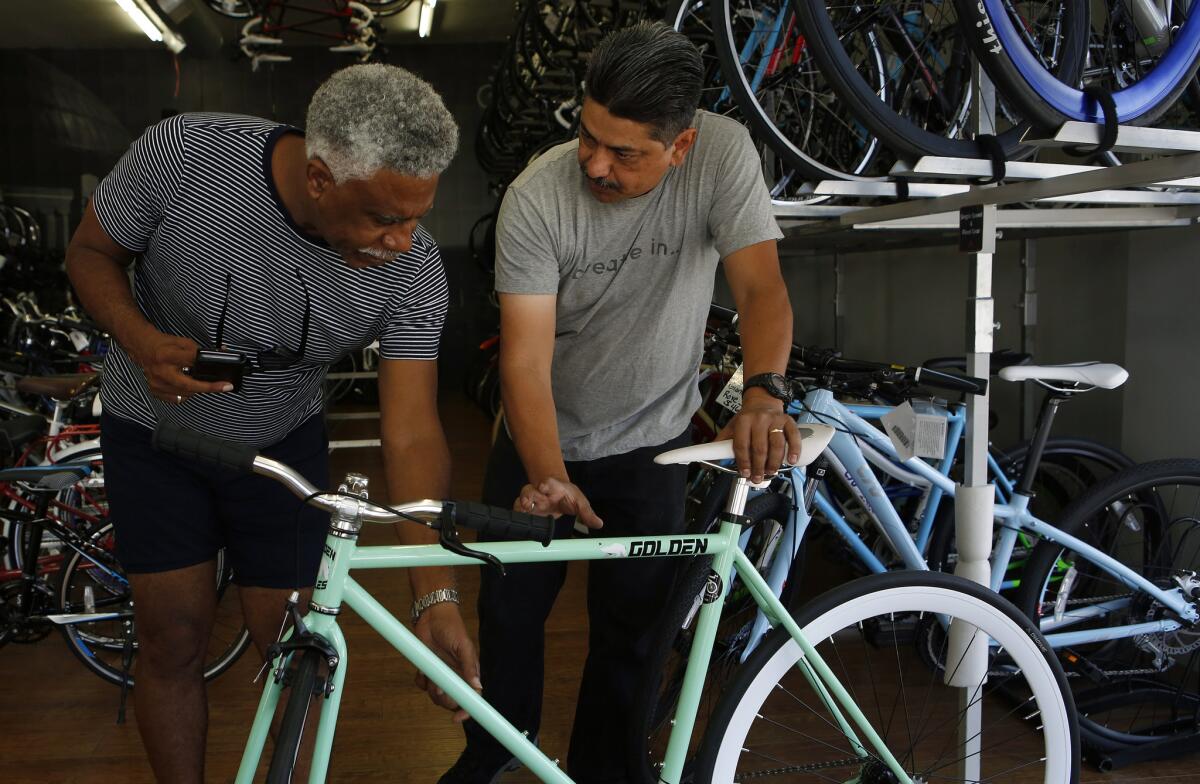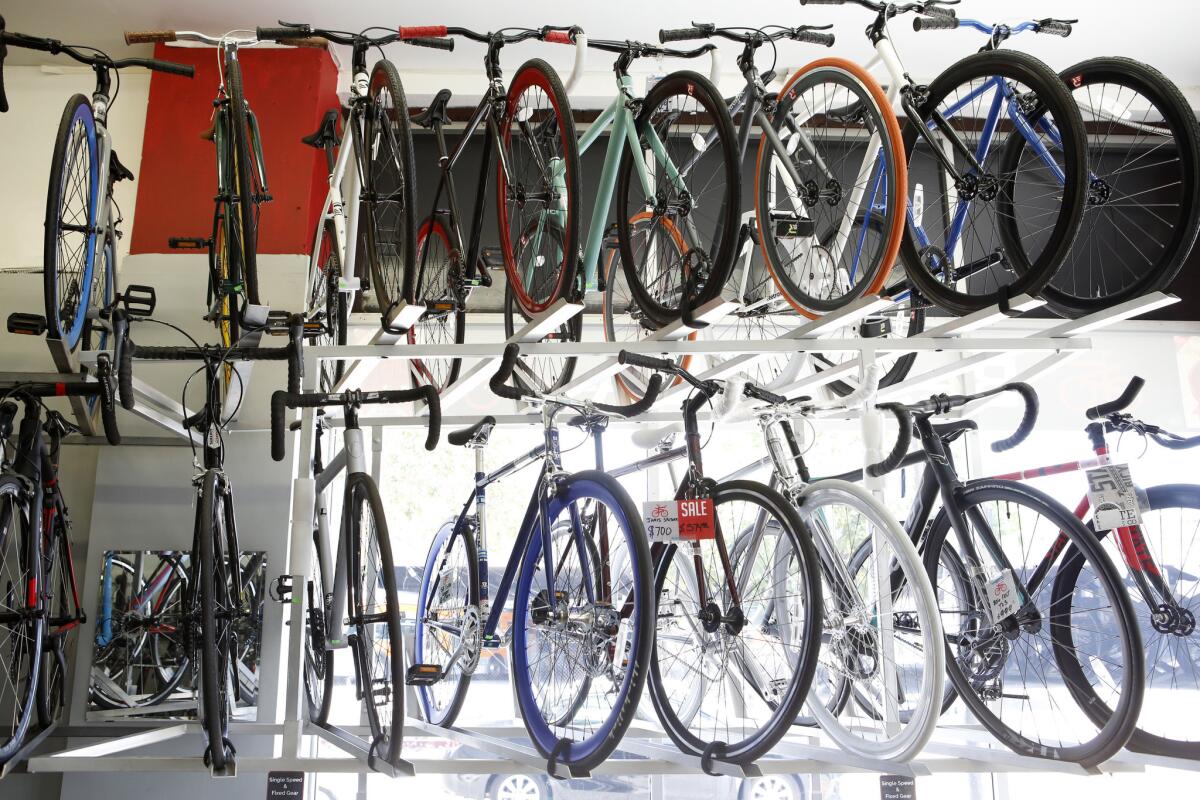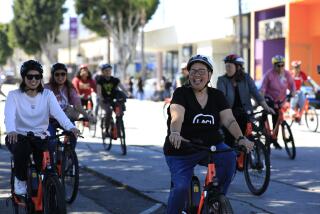Fixed gear bikes, once a status symbol of cool, are now everywhere

- Share via
As a student at Cal State Long Beach, J.W. Zhang saw a bicycle that changed his life — a sleek, single-speed called a fixed gear bike.
It was 2011, the height of the fixie craze, and Zhang was eager to hop on the bandwagon. But when he realized that the cheapest, second-hand versions sold for $500, he had bigger ideas.
“The bike was cool,” Zhang said. “But the price point was too high. I saw the potential market.”
Leaning on his family’s background in manufacturing, he eventually opened his own factory in China, producing bikes that cost as little as $199 through his City of Industry company Avant Enterprises. These inexpensive imports have fueled the rise of upstart bicycle brands, many of them in Southern California, and transformed fixies from a niche fad into a mainstream bicycle that has introduced new riders to cycling and lured others back to the activity.
See the most-read stories this hour >>
Fixies cannot coast, meaning if the bike is moving so are the pedals. In the biking world, this technology is primitive — obsolete since the invention of gears and wheels that can spin without active pedaling. For decades, fixed gear bikes were designed specifically for the velodrome, a racing arena featuring sharply banked oval tracks. Built for speed, these brakeless bikes cost upwards of thousands of dollars.
In the 1990s, bicycle messengers started riding fixies because of the ease of maintenance, their efficiency — and the thrill of weaving through traffic without the security of brakes. When messenger style had its moment (think messenger bags and rolled-up pant cuffs), fixies emerged as a new symbol of cool. Riders converted old bikes themselves or shelled out big bucks for a velodrome-worthy cycle.
Big bike brands such as Trek, Bianchi and Specialized took notice, pushing their own fixed gear bikes. Even Hollywood latched on, releasing in 2012 the film “Premium Rush,” a paean to fixies starring Joseph Gordon-Levitt.
Since then, fixies slipped from a status symbol beloved by aficionados, but they remain a relatively bright spot in a $6-billion industry that has been flat for the last decade, analysts and bike companies say. Although there are no sales data for fixed gears alone, the commuter and town bike category (which includes fixed gears) grew 15% last year from a year earlier, according to research firm NPD Group.
Unlike early adopters, urbanites who sought them out for the challenge and their air of exclusivity, many fixed gear buyers today are first-time cyclists or those returning after a long absence. They are opting for uncomplicated bikes like fixies without many components to master, analysts said.
“Something clean and simple appeals to them,” said Fred Clements, vice president of the National Bicycle Dealers Assn. “Sometimes people get intimidated by the equipment – you look at the back of the bike and it has a lot of cogs.”

A handful of bicycle companies based in Southern California have sprung up in recent years, sensing opportunity in offering imported fixed gear bikes at affordable prices.
Zhang introduced the Aventon and lower-priced 6KU brands after his factory first opened in 2013. His primary customer base, he said, are teenagers attracted by the style and price of his fixies. Zhang said he can produce his cheapest bike, which retails for $199, for about $100.
Avant Enterprises is on track to pull in $7 million in sales this year, Zhang said. Last year, it posted sales of $6 million, up from $1 million in 2013, Zhang said.
The competition among fixie companies is growing fierce.
Zycle Fix, which sells bikes under that name and also Throne Cycles, has dropped its prices as low as $199, down from $300, to compete with rivals, founder Ike Solano said.
“It’s turned into a mass bicycle,” Solano said. Fixies are “a normal bike you see on the street. You don’t have to be a supercool kid.”
Even mass merchants such as Target and Wal-Mart carry fixies (the latter offering one for $80).
Cities like L.A. that are trying to add bike lanes in an attempt to reduce congestion have also spurred more interest in biking. In 2013, bike ridership in Los Angeles shot up 7.5% from 2011, according to the Los Angeles County Bicycle Coalition.
When Restrospec Bicycles launched in 2009, bike shops kept asking for smaller frames to fit the hordes of teenagers eager to buy their bikes. But the Vernon company has seen demand rise for bikes in all sizes, said Dan Bon, vice president of sales and operations at Retrospec.
“We’re seeing even people into their 40s,” he said. “They like the simplicity and low maintenance.”
Rikki Williams, 60, bought his fixed gear in 2012 after admiring riders in Los Angeles. The Leimert Park resident said he wanted a bike that would push him physically as he got older.
“It’s not like a 10-speed bike, it’s more challenging,” Williams said. “I’m up in age, so I wanted to build my endurance.”
Williams said he loved his fixie so much that he bought one for his grandkids. He still goes on rides once a week (the fuchsia frame, he said, attracts plenty of admiring looks). A few years ago, though, Williams opted to install brakes after running into a car door.
“I was trying to do tricks like the kids,” he said. “I couldn’t stop.”
Many bike start-ups are getting a boost by selling directly to customers online.
Brian Ruben, a managing partner at Sole Bicycles in Venice, said his company is doing to bikes what e-commerce upstarts such as Warby Parker have done for eyeglasses.
Sole imports bikes from a Chinese factory in Shenzhen. About 90% of its sales are online, either from its own website or a third-party seller such as Amazon.com.
“The distribution model for buying bicycles is typically going to a mom-and-pop shop,” he said. “We created a website.”
The goal, he added, was to “commoditize a product that was hard to get and very expensive.”
Zycle Fix, based in South El Monte, has seen a similar tilt toward online.
Four years ago, about 70% of Zycle’s business came from bike shops, with the rest from online, Solano said. Now, that has flipped.
“It’s harder to get to every bike shop in every town, but the Internet reaches those places,” he said.
Some bike experts caution that cheaper bikes often mean poorer quality.
“It’s kind of scary in a way,” Clements said. “You might save 40%, 50%, but you don’t know where it comes from and you don’t know what the engineering is.”
“These are, after all, vehicles,” he added.
Some riders ultimately find riding a bike without gears to be too challenging.
Daniel Farahirad, co-owner of bike shop Just Ride L.A., said fixies make up about 30% of sales at the downtown Los Angeles store — down slightly from a few years ago, he said.
Many riders initially want a brakeless fixie, but later come back asking for them to be retrofitted with gears; some buy another bike that’s easier to ride, Farahirad said.
“The beauty is, it gets everyone into the door,” he said.
ALSO
‘Pokemon Go’ maker dreams of video games played on contact lenses
Champagne, tacos and time off: How Dollar Shave Club employees are celebrating $1-billion sale
This isn’t Candy Land: Exploding Kittens and others are reviving board and card games
UPDATES:
11:36 p.m.: An earlier version of this story misspelled J.W. Zhang’s last name as Chang.
More to Read
Inside the business of entertainment
The Wide Shot brings you news, analysis and insights on everything from streaming wars to production — and what it all means for the future.
You may occasionally receive promotional content from the Los Angeles Times.











